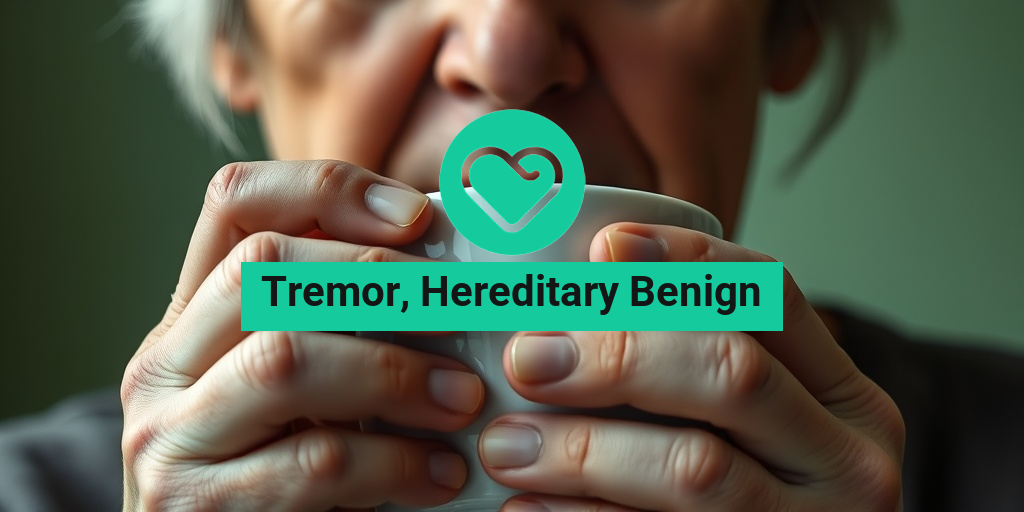What Is Hereditary Benign Tremor?
Hereditary benign tremor, often referred to as essential tremor (ET), is a neurological condition characterized by involuntary shaking or trembling, primarily affecting the hands, arms, and sometimes the head and voice. Unlike other types of tremors, hereditary benign tremor is generally not associated with any underlying disease and is considered a benign condition. It is important to note that while the tremors can be bothersome, they are not life-threatening.
This condition is often familial, meaning it tends to run in families. If you have a family history of tremors, you may be more likely to experience this condition yourself. The exact cause of hereditary benign tremor is not fully understood, but it is believed to involve genetic factors that affect the brain’s ability to control muscle movements.
Understanding the Genetics
Research indicates that hereditary benign tremor can be linked to specific genetic mutations. These mutations may affect the way the brain communicates with the muscles, leading to the characteristic shaking. If you are wondering, “Is benign essential tremor hereditary?”, the answer is yes; many individuals with ET have a family member who also experiences similar symptoms.
Prevalence and Demographics
Hereditary benign tremor is one of the most common movement disorders, affecting millions of people worldwide. It can occur at any age, but symptoms often become more noticeable as individuals reach middle age or older. Interestingly, both men and women are equally affected, although some studies suggest that women may experience more severe symptoms.
Symptoms of Hereditary Benign Tremor
The symptoms of hereditary benign tremor can vary widely among individuals, but they typically include:
- Involuntary Shaking: The most prominent symptom is the involuntary shaking of the hands, which can worsen during activities such as writing, eating, or holding objects.
- Postural Tremor: Tremors may become more pronounced when the affected person is holding a position against gravity, such as extending their arms.
- Voice Tremor: Some individuals may experience a tremor in their voice, making it sound shaky or quivery.
- Head Tremor: In some cases, individuals may also experience shaking of the head, which can be mistaken for a nodding motion.
- Fatigue: The constant effort to control tremors can lead to fatigue and frustration, impacting daily activities.
Impact on Daily Life
While hereditary benign tremor is not a debilitating condition, it can significantly affect a person’s quality of life. Simple tasks such as drinking from a cup, writing, or using utensils can become challenging. This can lead to feelings of embarrassment or self-consciousness, especially in social situations. Many individuals seek treatment not only to manage the physical symptoms but also to improve their overall well-being.
When to Seek Medical Advice
If you or a loved one is experiencing symptoms of hereditary benign tremor, it is essential to consult a healthcare professional. They can help determine whether the tremors are indeed benign or if they are a sign of a more serious condition. A thorough evaluation may include a physical examination, medical history review, and possibly imaging studies to rule out other causes of tremors.
For those looking for more information on hereditary benign tremor and its management, resources like Yesil Health AI (yesilhealth.com) can provide evidence-based health answers and support.
Conclusion
Hereditary benign tremor is a common condition that can affect individuals and families alike. Understanding the symptoms and seeking appropriate medical advice can help manage the condition effectively. Remember, while the tremors may be bothersome, they are generally not harmful, and many people lead fulfilling lives despite their symptoms. If you suspect you have hereditary benign tremor, don’t hesitate to reach out to a healthcare provider for guidance and support. 🌟

Causes of Hereditary Benign Tremor
Hereditary benign tremor, often referred to as essential tremor (ET), is a neurological condition characterized by involuntary shaking, typically affecting the hands, arms, and sometimes the head. While the exact cause of this condition remains somewhat elusive, several factors contribute to its development. Understanding these causes can help individuals manage their symptoms more effectively.
Genetic Factors
One of the primary causes of hereditary benign tremor is genetics. Research indicates that ET often runs in families, suggesting a hereditary component. If you have a family history of tremors, your risk of developing this condition increases significantly. Studies have identified specific genes associated with ET, including the ETM1 locus on chromosome 3, which is believed to play a crucial role in the disorder.
Neurological Changes
As individuals age, various neurological changes can occur, potentially leading to tremors. The brain’s ability to regulate movement may decline, resulting in the characteristic shaking associated with ET. This decline can be attributed to the loss of certain neurons in the brain, particularly in areas responsible for motor control.
Environmental Factors
While genetics play a significant role, environmental factors may also contribute to the onset of hereditary benign tremor. Exposure to certain toxins, such as heavy metals or pesticides, has been linked to an increased risk of developing tremors. Additionally, factors like stress and fatigue can exacerbate symptoms, making it essential to manage these elements in daily life.
Other Medical Conditions
Hereditary benign tremor can sometimes be associated with other medical conditions. For instance, individuals with hyperthyroidism, a condition characterized by an overactive thyroid gland, may experience tremors as a symptom. Similarly, certain neurological disorders, such as Parkinson’s disease, can present with tremor symptoms, although they are distinct from ET.
Risk Factors for Hereditary Benign Tremor
Understanding the risk factors associated with hereditary benign tremor can empower individuals to take proactive steps in managing their health. While some factors are beyond our control, awareness can lead to better lifestyle choices and early intervention.
Age
Age is one of the most significant risk factors for developing hereditary benign tremor. The condition is more prevalent in older adults, with symptoms often becoming noticeable around the age of 40 or 50. As the body ages, the likelihood of experiencing tremors increases, making it essential for older individuals to monitor their health closely.
Family History
If you have a family member diagnosed with essential tremor, your risk of developing the condition is notably higher. Studies suggest that nearly 50% of individuals with ET have a family history of the disorder. This familial link underscores the importance of genetic factors in the development of hereditary benign tremor.
Gender
Research indicates that gender may play a role in the prevalence of hereditary benign tremor. Men are generally more likely to develop the condition than women, although the reasons for this disparity are not entirely understood. Hormonal differences and variations in brain structure may contribute to this phenomenon.
Stress and Anxiety
Stress and anxiety can significantly impact the severity of tremors. Individuals who experience high levels of stress may notice an increase in tremor intensity. This connection highlights the importance of stress management techniques, such as mindfulness, meditation, and regular exercise, in mitigating symptoms.
Other Health Conditions
Certain health conditions can increase the risk of developing hereditary benign tremor. For example, individuals with a history of thyroid disorders, neurological diseases, or metabolic disorders may be more susceptible to tremors. Regular health check-ups and monitoring can help identify and manage these conditions effectively.
In conclusion, hereditary benign tremor is a complex condition influenced by a combination of genetic, neurological, and environmental factors. By understanding the causes and risk factors associated with this disorder, individuals can take proactive steps to manage their symptoms and improve their quality of life. 🌟

Diagnosis of Hereditary Benign Tremor
Diagnosing hereditary benign tremor can be a nuanced process, as it often requires a thorough understanding of the patient’s medical history, family background, and a series of clinical evaluations. This condition, also known as essential tremor, is characterized by involuntary shaking, typically affecting the hands, arms, and sometimes the head or voice. Here’s how healthcare professionals typically approach the diagnosis:
Medical History and Family Background
The first step in diagnosing hereditary benign tremor is a detailed medical history. Doctors will ask about:
- Symptoms: When did the tremors start? Are they constant or intermittent?
- Family History: Is there a history of tremors in the family? This is crucial, as tremors that run in families can indicate a hereditary condition.
- Other Medical Conditions: Are there any other neurological or medical issues that could contribute to the tremors?
Physical Examination
After gathering the medical history, a physical examination is conducted. The doctor will observe the tremors while the patient is at rest and during specific tasks, such as holding a cup or writing. This helps to determine the type and severity of the tremor.
Neurological Tests
In some cases, additional neurological tests may be necessary. These can include:
- Blood Tests: To rule out other conditions that may cause tremors, such as thyroid disorders or metabolic issues.
- Imaging Studies: MRI or CT scans may be performed to check for structural abnormalities in the brain.
- Electromyography (EMG): This test measures the electrical activity of muscles and can help differentiate between types of tremors.
Ultimately, the diagnosis of hereditary benign tremor is often made based on clinical findings and family history, as there are no definitive tests for this condition. If you suspect you have this condition, it’s essential to consult with a healthcare professional who specializes in movement disorders.
Treatment Options for Hereditary Benign Tremor
While there is currently no cure for hereditary benign tremor, various treatment options can help manage the symptoms and improve quality of life. The choice of treatment often depends on the severity of the tremors and their impact on daily activities. Here are some common approaches:
Medications
Several medications can be effective in reducing tremors:
- Beta-Blockers: Drugs like propranolol are often the first line of treatment and can help reduce tremor amplitude.
- Anti-Seizure Medications: Medications such as primidone may also be prescribed to help control tremors.
- Botulinum Toxin Injections: In some cases, injections can help reduce tremors in specific muscle groups.
Physical and Occupational Therapy
Engaging in physical and occupational therapy can be beneficial for individuals with hereditary benign tremor. Therapists can provide:
- Strengthening Exercises: To improve muscle control and coordination.
- Adaptive Techniques: Strategies to help manage daily tasks, such as using weighted utensils or specialized tools.
Surgical Options
For individuals with severe tremors that do not respond to medication, surgical options may be considered:
- Deep Brain Stimulation (DBS): This involves implanting a device that sends electrical impulses to specific brain areas, helping to reduce tremors.
- Thalamotomy: A surgical procedure that involves destroying a small part of the thalamus, which can help alleviate tremors.
Lifestyle Modifications
In addition to medical treatments, certain lifestyle changes can help manage symptoms:
- Avoiding Triggers: Stress, caffeine, and fatigue can exacerbate tremors, so managing these factors is crucial.
- Relaxation Techniques: Practices such as yoga, meditation, and deep breathing can help reduce stress and improve overall well-being.
While living with hereditary benign tremor can be challenging, understanding the condition and exploring available treatment options can empower individuals to lead fulfilling lives. If you or a loved one is experiencing symptoms, consult with a healthcare provider to discuss the best course of action. 🌟

Living with Hereditary Benign Tremor
Hereditary benign tremor, often referred to as essential tremor (ET), is a condition that affects many individuals, particularly as they age. This involuntary shaking can impact various parts of the body, most commonly the hands, head, and voice. While it is generally considered benign, meaning it is not life-threatening, living with this condition can present unique challenges. Understanding how to manage these challenges is crucial for maintaining a good quality of life.
Understanding the Condition
Hereditary benign tremor is typically characterized by rhythmic shaking that can occur during voluntary movements, such as writing or holding objects. The tremors can vary in intensity and may worsen with stress, fatigue, or caffeine consumption. Many individuals wonder, “Is benign essential tremor hereditary?” Yes, it often runs in families, indicating a genetic component. If you have a family history of tremors, you may be at a higher risk of developing this condition.
Daily Life Adjustments
Living with hereditary benign tremor requires some adjustments to daily routines. Here are a few strategies that can help:
- Adaptive Tools: Consider using utensils and tools designed for individuals with tremors. Weighted utensils, for example, can provide stability while eating.
- Relaxation Techniques: Stress can exacerbate tremors. Techniques such as deep breathing, yoga, or meditation can help manage stress levels.
- Limit Stimulants: Reducing caffeine and other stimulants can help minimize tremor severity.
- Seek Support: Joining support groups or connecting with others who have similar experiences can provide emotional support and practical advice.
Medical Management
While there is no cure for hereditary benign tremor, several treatment options can help manage symptoms. These may include:
- Medications: Beta-blockers and anticonvulsants are commonly prescribed to help reduce tremor severity.
- Physical Therapy: Engaging in physical therapy can improve muscle control and coordination.
- Surgery: In severe cases, surgical options such as deep brain stimulation may be considered.
It’s essential to consult with a healthcare professional to determine the best course of action tailored to your specific needs. Regular check-ups can help monitor the condition and adjust treatment as necessary.
Outlook for Hereditary Benign Tremor
The outlook for individuals with hereditary benign tremor varies widely. While the condition is generally not progressive, meaning it does not typically worsen over time, the impact on daily life can differ from person to person. Understanding what to expect can help individuals and their families prepare for the future.
Long-Term Management
Many individuals with hereditary benign tremor lead fulfilling lives with proper management. Here are some key points regarding the long-term outlook:
- Stability of Symptoms: For most, symptoms remain stable over the years. However, some may experience fluctuations in severity, particularly during stressful periods.
- Impact on Daily Activities: While tremors can interfere with tasks such as writing or eating, many find ways to adapt and continue engaging in their favorite activities.
- Emotional Well-Being: The psychological impact of living with tremors can be significant. Seeking counseling or therapy can be beneficial in managing feelings of frustration or anxiety.
Research and Future Directions
Ongoing research into hereditary benign tremor is promising. Scientists are exploring the genetic factors that contribute to the condition and potential new treatments. As our understanding of the disorder improves, individuals may benefit from more targeted therapies and interventions in the future.
In conclusion, while hereditary benign tremor can present challenges, many individuals find effective ways to manage their symptoms and maintain a high quality of life. With the right support and resources, it is possible to live well with this condition. 🌟

Frequently Asked Questions about Tremor, Hereditary Benign
What is Hereditary Benign Tremor?
Hereditary benign tremor refers to a type of tremor that is often inherited and typically does not indicate a serious underlying condition. It is characterized by rhythmic shaking, usually affecting the hands, arms, or head, and can be exacerbated by stress or fatigue.
Is Benign Essential Tremor Hereditary?
Yes, benign essential tremor is often hereditary. Many individuals with this condition report a family history of tremors, suggesting a genetic component. If you have a family member with this condition, you may be at a higher risk of developing it yourself.
What Causes Hereditary Tremors?
The exact cause of hereditary tremors is not fully understood, but it is believed to involve genetic factors. Certain genes may predispose individuals to develop tremors, and environmental factors may also play a role.
What Causes Benign Tremors?
Benign tremors can be caused by various factors, including stress, fatigue, caffeine consumption, and certain medications. In many cases, the tremors are not linked to any serious health issues and can be managed effectively.
Do Tremors Run in Families?
Yes, many people with tremors report that they have family members who also experience similar symptoms. This suggests that there may be a genetic predisposition to developing tremors, particularly hereditary benign tremor.
How Can I Manage Hereditary Benign Tremor?
Management strategies for hereditary benign tremor may include:
- Avoiding caffeine and stimulants
- Reducing stress through relaxation techniques
- Using assistive devices for daily tasks
- Consulting with a healthcare provider for potential medications
When Should I See a Doctor?
If you experience tremors that interfere with daily activities or if there is a sudden change in the severity of your symptoms, it is important to consult a healthcare professional. They can help determine the underlying cause and recommend appropriate treatment options.
Can Lifestyle Changes Help with Tremors?
Yes, making certain lifestyle changes can help manage hereditary benign tremor. Regular exercise, a balanced diet, and stress management techniques can contribute to overall well-being and may reduce the severity of tremors.
Are There Any Treatments Available for Hereditary Benign Tremor?
While there is no cure for hereditary benign tremor, treatments such as medications, physical therapy, and lifestyle modifications can help manage symptoms effectively. It is best to discuss treatment options with a healthcare provider.




